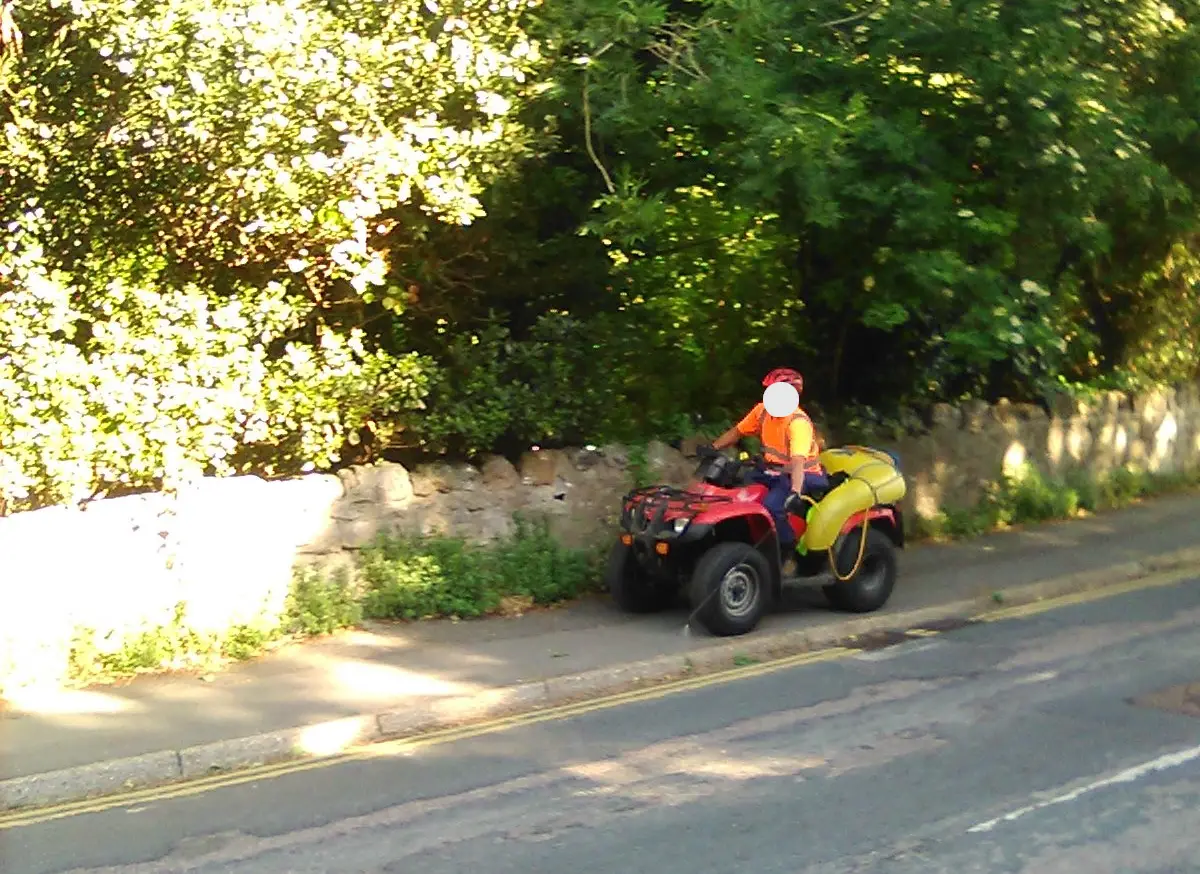The spraying of weedkiller on Isle of Wight roads and pavements has started again, as Coronavirus lockdown loosens. Along with that comes concerns about what is being sprayed and the potential damage it might be causing.
News OnTheWight has been looking into this and found that Isle of Wight council and their contractor, Island Roads, are still using a weedkiller which contains glyphosate – the herbicide ingredient at the centre of high-profile lawsuits, conflicting scientific studies and health claims. It’s use in the UK is still legal.
Several years
The Isle of Wight council has for a long time defended their use of glyphosate, as raised by News OnTheWight and its readers over several years.
Last April the IWC said they wouldn’t budge on concerns over herbicide spraying and the death of Ventnor’s wall lizards, with Cllr Ian Ward saying,
“This week we are being visited by a specialist in this field who is going to advise us about how these issues have been managed in other areas.”
The return of the spraying
With the Island Roads quad bikes back out spraying the roads and pavements across the Isle of Wight, News OnTheWight asked Cllr Ward what the specialist had advised, and which parts of that advice had been implemented.
A spokesperson for the Isle of Wight council told News OnTheWight,
“The specialist who visited last year, Dr Philip Sterling of Butterfly Conservation, gave advice and guidance to elected members and with them, visited a number of verges around the Island. This discussion, along with financial considerations, was one factor that led to the reduction in mowing frequency of rural verges which was introduced this season. The discussion did not lead to a change in the practice of applying herbicide.”
IWC use Gallup Hi-Aktiv
One unanswered question from last year’s query was the name of the product being used.
This week a spokesperson for the Isle of Wight council finally confirmed that Gallup Hi-Aktiv, which is a glyphosate-based product, is used. They added that it is “applied only when necessary to hard surfaces at road surface level”, continuing,
“There are currently no plans to change this practice. Spraying herbicide from a moving quad bike is legal if carried out safely to industry standards. We ensure this work is done by trained and competent operatives. “
Wheeler: Tightness in my chest and sore eyes
Earlier this week Adrian Wheeler (Ventnor) wrote to Island Roads with his concerns. He said,
“You have again been riding quad bikes illegally on the pavements in Ventnor and spraying a toxin indiscriminately at speed on a windy day. Your employee had no PPE whatsoever.
“I had a tightness in my chest and sore eyes after being passed by your operative.”
Island Roads told Adrian this herbicide, “is considered not harmful to the environment, animals, watercourse or fish when used correctly”.
Bridget Boudewijn also raised her concerns about the effect the herbicide could have on the Ventnor flora and fauna.
IWC: Our contractors are aware these lizards live in the walls
In response to concerns about the habitat of the Ventnor wall lizard, the IWC spokesperson told News OnTheWight,
“Vegetation removal on walled areas tends to be done by hand and – as is our practice in this kind of work – only after a visual inspection. This work does not usually involve herbicides.
“This kind of location is particular common in Ventnor. Our contractors are aware these lizards live in the walls and they bear this special habitat in mind when doing their work.
“In addition, when maintenance works are undertaken, if appropriate Island Roads have installed lizard tubes in Ventnor stonework to maintain habitat for lizards.”
What is Gallup Hi-Aktiv?
Gallup Hi-Aktiv is marketed as the “strongest weed killer” on the market and powerful enough to kill Japanese Knotweed.
Two years ago an American jury found that Roundup, Monsanto’s glyphosate-based weedkiller, “substantially” contributed to the terminal illness of a groundsman using the product.
How safe is glyphosate?
Three years ago the National Farmers’ Union (NFU) welcomed news that the use of glyphosate had been granted for a further five years by the European Commission Appeals Committee.
At the beginning of this year, Luxembourg was the first European Union country to completely ban products containing glyphosate.
EPA: Risks to terrestrial invertebrates and other organisms
However, in December 2019 the NFU reported on the recent findings by the US Environmental Protection Agency (EPA).
The EPA assessment on the use of glyphosate states that,
“While the agency did not identify risks to individual bees from glyphosate applications at rates below 5.7lb ae/A, risks to terrestrial invertebrates at higher application rates are uncertain.”
The EPA require following advisory is used to alert users to the potential impact to non-target organisms:
“This product is toxic to plants and may adversely impact the forage and habitat of non-target organisms, including pollinators, in areas adjacent to the treated site. Protect the forage and habitat of non-target organisms by following label directions intended to minimize spray drift.”





